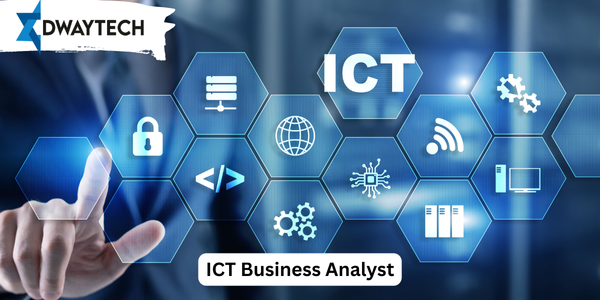In today’s rapidly evolving digital landscape, businesses must constantly adapt to stay competitive. One key player in this transformation is the ICT (Information and Communication Technology) Business Analyst. This role bridges the gap between IT and business, ensuring that technology solutions align with business goals.
Let’s delve into the responsibilities, skills, and impact of an ICT Business Analyst, and explore some frequently asked questions about this vital role.

The Role of an ICT Business Analyst
An ICT Business Analyst is responsible for analyzing and assessing a company’s technological needs and processes. They work closely with stakeholders to understand business requirements and translate them into functional specifications for IT solutions. This involves:
- Requirements Gathering: Engaging with stakeholders to gather detailed business requirements.
- Process Analysis: Evaluating existing business processes to identify areas for improvement.
- Solution Design: Proposing IT solutions that meet business needs and improve efficiency.
- Project Management: Overseeing the implementation of IT projects to ensure they are delivered on time and within budget.
- Stakeholder Communication: Acting as a liaison between the business and IT teams to ensure clear and effective communication.
Key Skills and Competencies
To excel as an ICT Business Analyst, one needs a blend of technical and soft skills. The following are some of the crucial skills:
1. Analytical Thinking
ICT Business Analysts must be able to dissect complex problems and devise effective solutions. This involves critical thinking and a keen attention to detail.
2. Technical Proficiency
A solid understanding of IT systems, software development, and database management is crucial. Familiarity with tools like SQL, ERP systems, and CRM platforms can be highly beneficial.
3. Communication Skills
Effective communication is vital. Analysts need to convey technical information to non-technical stakeholders and vice versa.
4. Project Management
Strong project management skills ensure that projects are completed on time and within budget. This covers risk management, resource allocation, and planning.
5. Business Acumen
Understanding the broader business context and industry trends helps ICT Business Analysts propose solutions that align with strategic goals.
The Impact of an ICT Business Analyst
The contributions of an ICT Business Analyst can significantly impact a business. By optimizing processes and implementing efficient IT solutions, they help to reduce costs, improve productivity, and enhance overall business performance. Additionally, they play a critical role in digital transformation initiatives, enabling businesses to leverage new technologies and stay competitive.
Conclusion
The role of an ICT Business Analyst is both dynamic and critical in today’s business environment. By bridging the gap between business needs and technological solutions, they help organizations thrive in a digital world. Their ability to analyze, design, and implement IT solutions not only optimizes business processes but also drives innovation and growth.
If you’re considering a career as an ICT Business Analyst, developing a strong foundation in both business and technology, along with excellent communication and analytical skills, will be essential to your success.
FAQs
1. What is the difference between a Business Analyst and an ICT Business Analyst?
While both roles involve analyzing business needs and proposing solutions, an ICT Business Analyst specifically focuses on IT-related solutions. They require a deeper understanding of technology and how it can be leveraged to meet business objectives.
2. What qualifications are needed to become an ICT Business Analyst?
Usually, one needs a bachelor’s degree in business administration, computer science, information technology, or a similar discipline. Many ICT Business Analysts also pursue certifications such as Certified Business Analysis Professional (CBAP) or ITIL Foundation to enhance their credentials.
3. What industries employ ICT Business Analysts?
ICT Business Analysts are employed across a wide range of industries, including finance, healthcare, retail, manufacturing, and government. Any sector that relies on IT solutions to streamline operations and enhance productivity can benefit from their expertise.
4. What are some common challenges faced by ICT Business Analysts?
Common challenges include managing stakeholder expectations, dealing with changing requirements, ensuring clear communication between technical and non-technical teams, and staying updated with the latest technological advancements. Effective problem-solving and adaptability are key to overcoming these challenges.
Also, Useful Links:
Business Analyst Training Course Online Request Demo










